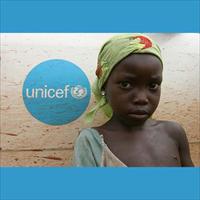50,000 displaced receive assistance from UNICEF as fighting intensifies in eastern DRC

The heavy fighting in North Kivu, DRC, has intensified over the last 48 hours causing massive displacement of tens of thousands of people towards Goma, the provincial capital. Most of the fighting has concentrated around the town of Kibumba in the Rutshuru territory, from where about 40,000 people - many of whom were already displaced - have fled northwards in the direction of Kanyabayonga. Others have fled from Rutshuru town and surrounding villages towards the Ugandan border.
Kibumba was home to about 17,000 displaced people who were residing in spontaneous makeshift camps. All 17,000 have been displaced once again. “We’re now seeing thousands of people displaced for the second, third and even fourth time in North Kivu", noted Julien Harneis, Chief of Field Operations for UNICEF in Eastern DRC. "The effects of these recurrent displacements are devastating for children and for women. Under such conditions, there is always the risk of cholera and measles outbreak, and increased cases of malnutrition among children. If there’s no reprieve in the fighting and displacements, the consequences will be life-threatening for the children and their families."
UNICEF has positioned stocks of essential household utensils and items such as blankets and plastic sheeting in eastern DRC. UNICEF partners Solidarités and the International Rescue Committee will distribute these as soon as the displaced families are able to settle down in a secure location. Before the fighting intensified, there were between seven and eight thousand displaced persons in the Kibati camps outside of Goma. In the last three days alone, the numbers have swelled to around 50,000 with many of the newly arrived persons sheltering in nearby churches, school buildings and in the open air just outside the camp.
UNICEF has continued to provide humanitarian assistance to the displaced people in the Kibati camps, trucking and distributing potable water through its partner Mercy Corps, and building additional latrines in and around the camps to accommodate the surge in numbers. In partnership with Save the Children UK, UNICEF is also identifying separated children to be placed with host families within the camps until they can be reunified with their parents. Since the beginning of October, and before the current surge in fighting, 193 separated children had been identified. 46 of them had been reunified with their families.
All armed groups and actors must respect the rights of children and ensure that all children have access to the protection of their families, to healthcare and to education.
About UNICEF
UNICEF is on the ground in over 150 countries and territories to help children survive and thrive, from early childhood through adolescence. The world’s largest provider of vaccines for developing countries, UNICEF supports child health and nutrition, good water and sanitation, quality basic education for all boys and girls, and the protection of children from violence, exploitation, and AIDS. UNICEF is funded entirely by the voluntary contributions of individuals, businesses, foundations and governments.
See Also
- WHO and health partners lead massive cholera response in eastern Democratic Republic of the Congo
- SOMALIA: Aid appeal broadened to cope with massive displacement
- DRC: At least 20 civilians killed in North Kivu clashes
- Oxfam raises alarm about escalating Congo violence
- CHAD: Relief workers adapt to fresh violence
 Back and Next - Back and Next
Back and Next - Back and Next See Also - See Also
See Also - See Also